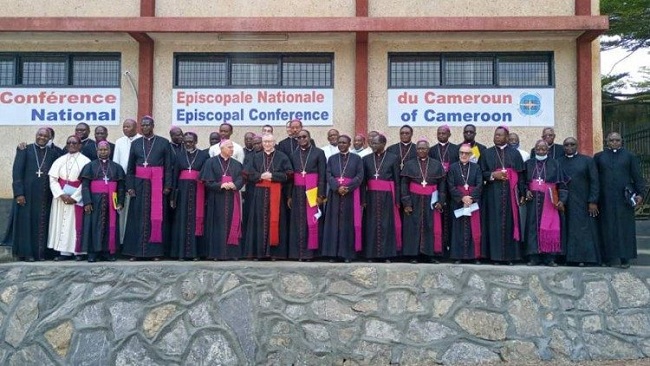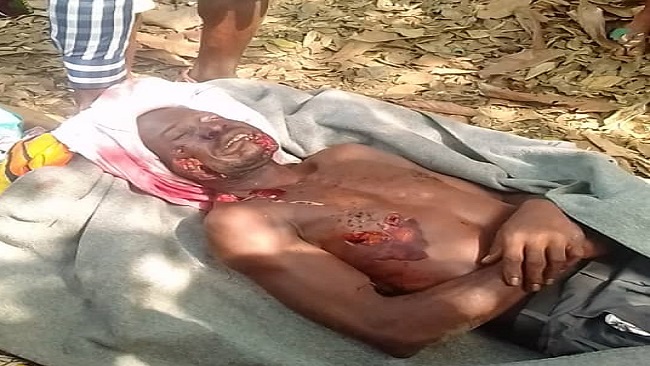1, February 2021
Bamenda: Cardinal Parolin brings Pope’s message of peace to Cameroon 0
Cardinal Secretary of State Pietro Parolin expresses Pope Francis’ closeness and concern for Cameroon and the African continent, in his homily during the imposition of the pallium on Archbishop Andrew Nkea Fuanya of Bamenda.
“The Pope is well aware of the difficulties that you have experienced in recent years and which you are still experiencing. He implores the Lord’s consolation for you, especially for those who have been victims of violence or who, in this crisis, have lost friends and loved ones.”
Those were the words delivered by Vatican Secretary of State, Cardinal Pietro Parolin, in his homily at Mass in Bamenda for the imposition of the pallium on Archbishop Andrew Nkea Fuanya.
He expressed Pope Francis’ closeness to the people of Cameroon, as well as to the entire African continent.
The Pope, added the Cardinal, “joins in the desire for peace and reconciliation that rises from this beloved and wonderful land toward God.”
Reconciliation, compassion, hospitality
Cardinal Parolin arrived in Cameroon last Thursday accompanied by Monsignor Ivan Santus, an official with the Section for Relations with States of the Secretariat of State.
His visit is meant to be a concrete sign of the Pope’s commitment and solidarity, and a call to promote compassion, reconciliation, and healing, especially in the context of the ongoing Covid-19 humanitarian emergency.
In communion with the Pope
“The Pallium,” explained Cardinal Parolin in Bamenda Cathedral, “is a symbol of a special bond of communion with the Pope. It is woven from the wool of lambs blessed by him on the feast of St. Agnes, and evokes the figure of the Good Shepherd, who goes in search of the lost sheep and places it on His shoulders. It represents the power that the Archbishop exercises in his Diocese, in communion with the Supreme Pontiff. It is a sign rich in meaning, which powerfully inaugurates the mandate of every new Archbishop: his new ministry is placed from the beginning under the sign of communion, in obedience and union with the Holy Father and in communion with his brother Bishops.”
With the Gospel in his pocket
“While many voices resound around us; while so many want to act as teachers in our lives,” the Cardinal stressed, we need to give “unique weight to the Word of Christ.”
“For this reason,” he added, “the Pope, on several occasions, has invited us to carry a small book of the Gospels with us. ‘The Gospel in your pocket’ is not a slogan but a spiritual program.”
The effectiveness of the Word
“Jesus desires good for humanity, and therefore frees us from Evil,” said Cardinal Parolin. “Jesus is able to completely free us precisely through His simple and powerful Word: Come out of him! There are no magic formulas; not even strange gestures: it is His Word that is exceedingly effective.”
The Secretary of State underlined that “Evil exists and Christ is able to defeat it. It is up to us to carry on this battle every day.”
Serenity and vigilance
Cardinal Parolin then evoked the teaching of the Apostle Paul, indicating two important themes that must mark each person’s spiritual journey: serenity and vigilance.
“Serenity: because with Christ we are victorious, in our adherence to Him through prayer and the Sacramental life. Vigilance: so that we can discern Evil where it lurks, beginning with our own hearts.”
Seed of hope
Cardinal Parolin then urged the faithful of Cameroon to combat the violence, divisions and fratricidal struggles that afflict the nation.
“He who fights against the evil that dwells in his heart becomes a bearer of good and peace in his family, among his friends, in his community. He thus becomes a seed of hope for all.”
Avoiding the risk of spiritual pride
The Vatican Secretary of State concluded his homily by recalling that after two thousand years, amazement before the Lord Jesus is a precious attitude to be guarded with care.
“We should never stop reflecting on this Mystery, so that we avoid the risk of spiritual pride, of those who are convinced that they already know everything about Jesus, without realizing that He is always greater than we can humanly comprehend. We should never cease to marvel before the fundamental Mystery of our Christian faith: that of the Son of God who became man to set us free.”
The Mass in the Cathedral of Bamenda was attended by a large number of the faithful, offering a sign of affection for Archbishop Fuanya and of joyful communion with the Pope who was represented by his Secretary of State.
Source: Vatican News




















1, February 2021
Promotion of Bilingualism and Multiculturalism: Can Musonge unite the two Cameroons? 0
Created with great pomp in 2017 and presented as a solution to the socio-political crisis shaking Cameroon, the ‘Commission pour la Promotion du Bilinguisme et du Multiculturalisme’ [Committee for the Promotion of Bilingualism and Multiculturalism] is struggling to bring a deeply divided country together.
Peter Mafany Musonge slowly made his way to the Yaounde Convention Centre. On 21 January, the former prime minister of Cameroon attended a meeting there along with the other 14 members of the Commission pour la promotion du bilinguisme et du multiculturalisme [National Committee for the Promotion of Bilingualism and Multiculturalism] (CNPBM), an institution he has headed since its creation in 2017.
As he settled into meeting room “A”, where the biannual session took place, Musonge was aware that his citizens have a long list of demands. Especially since, for the year 2021 alone, its budget amounts to about 3bn CFA francs (€4.5m) – a substantial budget in a context of crisis, in which resources are scarce. The adoption of this package is, moreover, the main item on the agenda.
“This budget will allow us to carry out our three main programmes,” said Musonge in a brief statement to the media at the end of the session. “The programme on bilingualism, which is to be extended and implemented throughout the country, the programme on multiculturalism and living together and, finally, the one on governance and institutional support.”
“No effects on the ground”
A plan of action that should give a boost to activities in the field and silence criticism. There are indeed prominent public voices denouncing the organisation’s wait-and-see approach, given the fact that the social climate is deteriorating as the days go by. The events that occurred during the 2018 presidential election were a continuation of the problems that have affected the country since the Anglophone crisis began in 2016.
Musonge himself acknowledges a resurgence of “intra-community stigmatisation.” “In the political field, frightening expressions such as ‘supremacists’ or ‘ethno-fascists’ are used to label certain individuals or groups […] On the economic front, odious rhetoric is directed against certain tribes that are depicted as ‘land thieves’ and ‘invaders.’ This worrying phenomenon can lead to uncontrollable acts of violence,” he said in a forum at the end of 2020.
Civility
Presented three years ago as the solution to these divisions, the CNPBM is struggling to break a cycle that has plunged the country into a climate of anxiety and where violence is ongoing. “We don’t feel the effects of this committee on the ground,” says Peter O., a resident of Yaoundé. “Since its members were installed, hate speech between communities has increased. Even the Anglophone crisis, which was at the origin of its creation, is still ongoing.”
No reforms, no sanctions
The controversy over the purchase of company cars, which tainted the institution in August 2018, is still fresh in many people’s minds. The revelations surrounding a public contract of 700m CFA francs – awarded by mutual agreement and intended for the purchase of 15 Toyota Prado V8 vehicles for members of the committee – had shocked public opinion.
However, according to several observers, the committee’s apparent inertia is above all due to its structure and prerogatives. “It is difficult to expect anything from such a consultative body. Resolving the socio-political crises that undermine the country is a matter of governance, but this commission does not have the power to implement reforms,” says Franck Essi, a consultant for the think tank Strategies Consulting Firm.
“Its members took part in the major national dialogue [held in early October 2019], but they had no decisive role in organising and facilitating discussions. Nor does the commission have the means to track down and punish the abuses observed in society.”
Criticism that CNPBM members reject, highlighting their contribution to the adoption of laws promoting official languages and on hate speech. “The committee is not in hibernation,” said Musonge. “We are doing conceptual work for the head of state. Sanctions are not a priority for the committee” said George Ngwane, one of its members. “The important thing is to push people to adopt good practices.”
Will this be enough? Only time will tell.
Culled from Africa Report